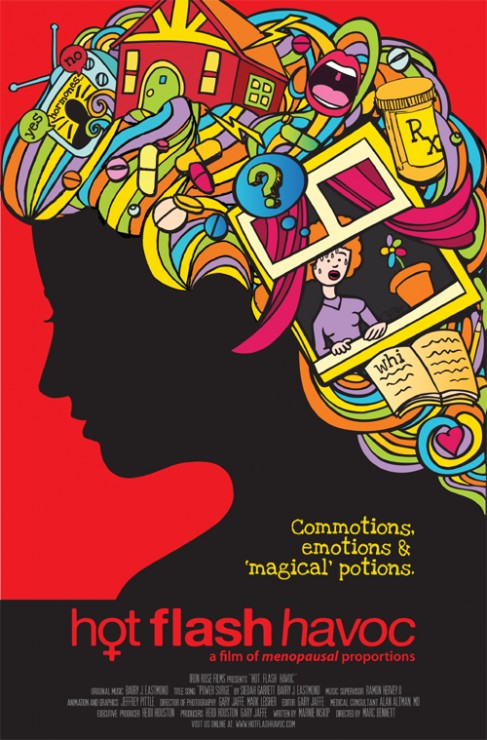 Okay, I haven’t seen the film in full yet. And, yes, I’ll admit right up front that I’m not menopausal yet. And for many readers this may be enough to discount what I might say here, but….
Okay, I haven’t seen the film in full yet. And, yes, I’ll admit right up front that I’m not menopausal yet. And for many readers this may be enough to discount what I might say here, but….
I have interviewed quite a number of menopausal women in the last ten years and very few have been as negative about menopause as the new documentary, Hot Flash Havoc. It was just released this summer and was screened at the Aspen FilmFest 2010 this week, and from the writeups in the Aspen Times and Snowmass Sun this past weekend, this documentary is definitely a winner.
If you like to think about your normal processes as problematic and in need of fixing, that is. Now, I’m not saying that there aren’t awful signs and symptoms that individual women have to find a better way of dealing with and that we shouldn’t busy ourselves with finding ways to make bothersome signs and symptoms dissipate (this is indeed an important activity), but the sense I get from reading all of the writeups of the film and watching the various trailers for the film on YouTube is that Hot Flash Havoc (and its filmmaker, Heidi Houston) define menopause as a crisis that is wrecking middle-aged women’s lives everywhere.
In addition, the entire film seems to be advocating a gentler critique of WHI results and for women to increase their usage of hormone therapies. Overall, I feel like this film moves us backwards rather than forwards in our search to help women answer questions about their own midlife experiences. Houston is quoted in interviews as saying things like “let’s fix our women” by helping them “manage menopause.” Seriously? I feel like I’m reading Robert Wilson’s 1966 work about keeping women “feminine forever.”
Speaking of which, men’s desires and needs seem to figure prominently in this film, in that menopausal women are portrayed as doing damage to men. Can’t we move on from ideas like this?
And I’m not the only one critiquing this film, by the way. Other bloggers hate it too. This is NOT a film worth supporting at all, unless we believe that menopause is a terrible thing, and a condition that needs to be fixed.
I have my critiques of Menopause! The Musical, but compared to Hot Flash Havoc, Menopause! The Musical is great!!!!


Thanks for the link Heather. Indeed, this film is an example of disease fear-mongering of the highest degree. I was appalled at the lengths it went to deningrate, not celebrate, midlife and aging. Good post.
Appalled pretty much sums up my feelings too. I could not believe what I was watching. Thanks for the comment!
This “Hot Flash Havoc” film is re-enforcing the outmoded prejudice that menopause
(by which I mean the normal life phase beginning a year after the last
menstruation) is “estrogen deficiency.” This is yet more of the backlash to
the Women’s Health Initiative study results and revisionism of science.
Which is not to say that women with frequent and intense hot flushes and
night sweats don’t need safe and effective treatment. We have shown that
oral micronized progesterone (progesterone, Prometrium, 300 mg at bedtime) is
highly effective for these troublesome hot flushes. However, I’m not allowed to
tell you about it because the results haven’t yet been published in a peer
reviewed journal.
And–although it is the first ever registered, scientific randomized, controlled
trial of progesterone for hot flushes and night sweats, it was rejected without
review at a major general medical journal.
What’s interesting to me is that the woman in this clip describes the problems
STOPPING Premarin with medroxyprogesterone (Prempro). This withdrawal phenomenon
is real and important–it is highly bothersome for at least 25% and maybe half of
all women who try to stop hormone therapy, especially if they’ve started it for
hot flushes. This perfectly fits with the notion that hot flushes are really
evidence of estrogen addiction–withdrawal causes a syndrome like heroin with-
drawal. Maybe its better not to take estrogen for hot flushes in the first place
now that there is something (progesterone) that helps addictions and doesn’t
itself cause a withdrawal syndrome.
Thanks, Jerilynn. Sounds like you could have treated the filmmaker, Heidi Houston, better than the “30 doctors” it took to finally diagnose her as “in menopause.” If it is true that so many doctors could not recognize signs of perimenopause and/or her problems with HT, I think that in itself should have been what the film was about!